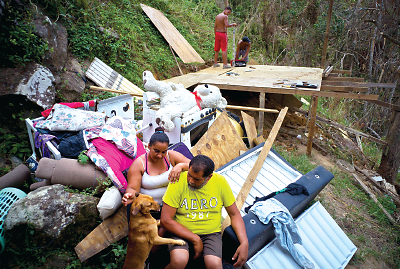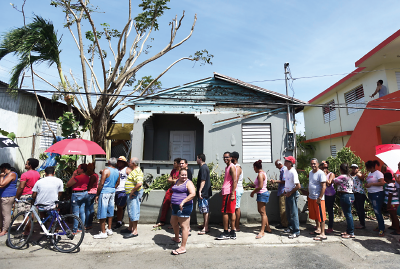Puerto Rico Reeling After Maria; U.S. Psychiatrists Plan Visit to Island
Abstract
The speaker of APA’s Assembly told Congressional representatives that flooding has been associated with elevated levels of anxiety, depression, and posttraumatic stress disorders.
As Psychiatric News went to press, the U.S. territory of Puerto Rico was reeling from the devastation of Hurricane Maria, and conditions there were dire.

Yadira Sortre and William Fontan Quintero sit with what is left of their belongings as their children build a room for protection against the elements after Hurricane Maria devastated Puerto Rico last month. “We lost everything,” Fontan Quintero said. Addressing the mental health needs of the island’s residents will require an ongoing effort.
Much of the island was without power after Maria swept across the territory on September 20, making communication difficult or impossible. Puerto Rico was already recovering from Hurricane Irma, which hit the island just two weeks prior to Maria.
Hector Colon-Rivera, M.D., past chair of the APA/APAF Minority Fellowship Program and a graduate of Ponce School of Medicine and Health Science in Puerto Rico, told Psychiatric News that he was preparing a team of psychiatrists to go to the island to provide direct services. As of the last week of September, the airport in San Juan was only just opening, and Colon-Rivera said it would be two weeks or more before the team would be prepared to depart.
Colon-Rivera is the coordinator of “Salud A Flote,” an educational radio segment transmitted every other Thursday by Radio Vieques, a nonprofit radio station serving Puerto Rico.
Meanwhile, APA leaders were making efforts to reach out to the district branch in Puerto Rico and urged members to help however possible.
“Hurricane Maria was the second major hurricane to hit Puerto Rico this month and the strongest storm to hit the U.S. territory in nearly 90 years, leaving much of the island destroyed with no electricity, food, or clean water,” wrote APA President Anita Everett, M.D., and APA CEO and Medical Director Saul Levin, M.D., M.P.A., in a September 26 email to the APA leadership.
They said assistance is available to the Puerto Rico Psychiatric Society through APA’s Erich Lindemann Disaster Support Grant and the APA Foundation’s Disaster Relief Fund. APA also sent letters to the Trump administration and Congressional leaders in support of federal aid to the U.S. territory.
The APA Foundation’s fund was set up to provide services to those impacted by major disasters. Members are urged to visit the Foundation’s Disaster Relief page. Additionally, Everett and Levin recommend the following organizations and resources for members who want to help:
United for Puerto Rico: This organization, spearheaded by the Puerto Rican First Lady Beatriz Areizaga, details how individuals or companies can donate emergency and construction supplies, including bottled water, hand sanitizer, formula, extension cords, tarp, and safety glasses.
The One American Appeal: This organization, spearheaded by the five living former U.S. presidents (Jimmy Carter, George H.W. Bush, Bill Clinton, George W. Bush, and Barack Obama), has been expanded to include recovery efforts in Puerto Rico and the U.S. Virgin Islands.
Everett and Levin said that most organizations are asking for cash rather than supplies, so they can quickly route money exactly where it’s needed. The National Voluntary Organizations Active in Disasters is coordinating individual and corporate donations.
Everett and Levin said that once infrastructure is stable, the island will also need volunteers.

People impacted by Hurricane Maria last month wait in line at Barrio Obrero in San Juan to receive supplies from the National Guard.
“The Red Cross has deployed funds and volunteers to Houston, the Florida Keys, and Puerto Rico,” Everett and Levin wrote. “APA and the APA Foundation have assisted with these efforts. APA also has educational resources on its “Disaster and Trauma” webpage, which includes a link to disaster mental health training from the American Red Cross. This information was provided to the Puerto Rico Psychiatric Society before hurricane Maria hit the island.”
APA Assembly Speaker Theresa Miskimen, M.D., who has family in Puerto Rico, told Psychiatric News that the outpouring of support has been swift, “but there is so much more to be done.”
Miskimen, communicating with Psychiatric News on September 30, said, “Over the past week, I have been in sporadic contact with Michel Woodbury-Farina, M.D., a member of the Puerto Rico Psychiatric Society, and indeed the situation is dire. The Assembly and the APA Disaster Committee have been working on various fronts on how to best offer relief.”
Miskimen participated in a Capitol Hill visit on September 27 with other APA leaders and representatives from six other medical organizations—the American Academy of Family Physicians, the American Academy of Pediatrics, the American Congress of Obstetricians and Gynecologists, the American College of Physicians, and the American Osteopathic Association. In addition to health care reform, they talked about relief efforts for Puerto Rico.
“We highlighted the humanitarian crisis confronting Puerto Rico in the aftermath of Hurricane Maria, including health-related repercussions,” Miskimen told Psychiatric News. “Experiencing disasters related to climate and weather can cause significant distress and contribute to more serious mental health issues. We also know that flooding has been associated swith elevated levels of anxiety, depression, and posttraumatic stress disorders, thus increasing the need for mental health services in the aftermath of climate-related disaster. Another such health repercussion is the potential threat for a reemergence of the Zika virus as a consequence of the extensive flooding, which provides the perfect breeding ground for mosquitoes. All six medical groups stand ready to work with members of both parties to come up with health care solutions in all these various fronts that put patients first.” ■



